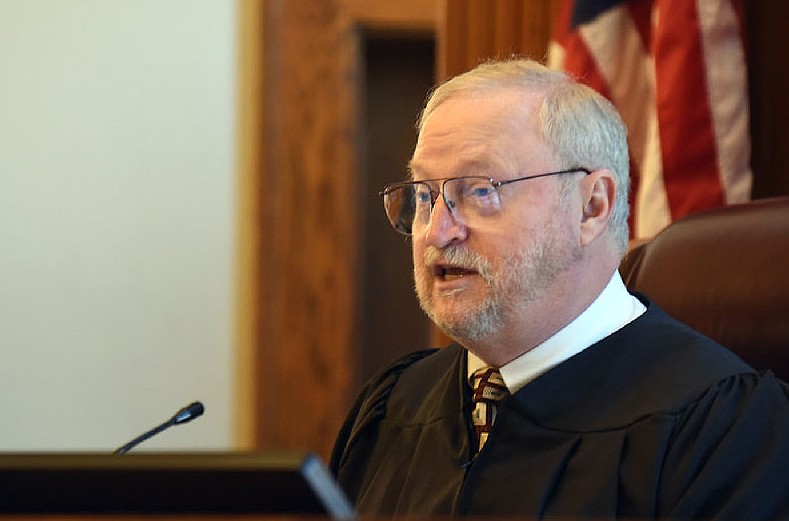Cole County Circuit Judge Jon Beetem last week issued a preliminary injunction blocking the state from eliminating the Merit System - at least as it applies to labor groups that filed a lawsuit last year challenging the new law.
Three unions, representing a number of state employees, said in a lawsuit filed last October that at least some parts of a 2018 state law, known as Senate Bill 1007 - that made major changes to the 70-year-old Merit System for state employees - violate provisions of the Missouri Constitution.
The unions filing the suit were the American Federation of State, County and Municipal Employees, AFL-CIO, Council 61 (AFSCME); the Communications Workers of America, AFL-CIO, Local 6355 (CWA); and Service Employees International Union, Local 1 (SEIU).
In a seven-page order issued Friday afternoon, Beetem blocked the state from "interpreting and applying SB 1007" as well as the Personnel Advisory Board's "Emergency Rules Proposed Rules, and any policies seeking to effectuate SB 1007 and PAB's Rules," in any manner that "1) infringes on or is inconsistent with the right to collectively bargain and/or 2) impairs the rights of the parties created by the AFSCME contract."
Also, as long as the lawsuit continues, Beetem said the state must "bargain in good faith with AFSCME, SEIU and CWA over the terms of successor (collective bargaining agreements), without any constraint from" the new law.
In the 32-page lawsuit filed last October, the union groups argued: "Senate Bill 1007 made drastic changes to essential terms and conditions of employment for state employees, by purportedly designating them as 'at will' employees, thereby subjecting them to termination for 'no reason or any reason,' with the exception of a small group of state employees who are required to have merit system protections pursuant to terms of federal funding."
Created in the mid-1940s, the system was, according to the Office of Administration's web page, "designed to protect employees from arbitrary actions, personal favoritism, and political coercion," and most recently covered about 56 percent of all state employees, while the others worked at non-Merit departments and agencies.
But the new law - signed into law by then-Gov. Eric Greitens on his last day in office before resigning from it - put all state employees under the same, non-Merit regulations.
The changes included removing the testing requirements to qualify for a job, and canceling the appeals process for a Merit System employee who was disciplined or fired.
The lawsuit argued state officials and the heads of various departments or agencies "unilaterally imposed (new) policies" when the new law went into effect, and those changes "purport to prohibit state employees from bargaining, through their union, for a requirement that discipline be imposed only 'for cause' - an essential term and condition of employment that Plaintiffs have negotiated for decades, and that is reflected in contracts between Plaintiffs and Defendants, and that protect employees from arbitrary termination for no reason or any reason."
The lawsuit said collective bargaining rights are protected by at least two sections of Missouri's Constitution - and Beetem agreed.
Quoting two previous court rulings from 2012, he wrote: "The right to collectively bargain is a fundamental right arising under the Missouri Constitution" and "the State can have 'no significant interest in the enforcement of a likely unconstitutional' law, and it is 'always in the public interest to protect the constitutional rights.'"
Chris Nuelle, spokesman for Attorney General Eric Schmitt, told the News Tribune on Monday afternoon: "We are studying the courts' rulings as we consider next steps. However, we will continue to defend our Constitution and the constitutionality of the statues enacted by the Legislature."
Although the 2018 law changed the Merit System for about 56 percent of the state's workforce, St. Louis lawyer Chris Grant told the News Tribune on Monday that Beetem's order only applies to unions, at least while the arguments in the lawsuit continue.
"Plaintiffs read (the order) to apply to AFSCME, CWA and the SEIU, but the legal principles apply equally to other unions and state employees who exercise their constitutional right to bargain," Grant wrote. "We do not read the order to completely block implementation of SB 1007 during the pendency of the lawsuit."
Beetem's preliminary injunction was issued the same day a judge in St. Louis County issued one in a different case, challenging another 2018 state law that placed restrictions on unions' ability to organize state employees and to collect dues.
In a statement issued Monday, AFSCME Council 61 President Danny Homan commented on both orders: "It is a victory for working Missourians to have the implementation of blatant union-busting bills halted with the granting of our request for preliminary injunctions.
"Anti-union forces are sure to try and challenge this legal victory, but as a union that fights every day for public employees' rights on the job, we are confident that justice will prevail."
Beetem scheduled a status hearing March 29 with the lawyers in the Merit System case.

